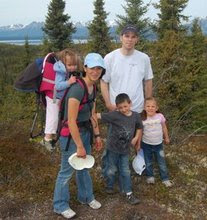Primarily heating with fuel oil is fine until you have to fill your 500 gallon tank, and when you have to fill it more than once a year because it has stayed 40 below zero for just a couple weeks too long, you start to feel it in the pocket book at $7.00 to $8.00/gal. Woodcutting, (with a subsistence use permit for the National Park) not only helps to supplement the heating of the house, it also provides exercise and an excuse to get outdoors. If your were to put pen to paper and work out the economics of it all, with the time involved, gas for the snowmachines, the cost of sleds, saws, and parts for all, I'm sure that fuel oil isn't really that much more costly than wood, but it's fun. My 10 year old even is able to haul a load with the smaller sled behind his Bravo.
There are limitations in the National Park about the kinds and size of trees that are harvested. Standing dead Spruce (Beetle Kill) is always a favorite because there is no size limit, live spruce has to be under a specific diameter. Birch is good as well, but needs to be seasoned for at least one year and preferably two before burning, it is also harder to work with because of its weight, it isn't already dry like the dead spruce. Getting the wood to the house can be a challenge. Maneuvering a snowmachine down a hill becomes tedious when you have a 600lb sled attached and pushing you. This year I only had to sacrifice a steering arm and the front bumper, but didn't suffer any injuries.
The Spring sun has already diminished the snow quality and depth, which has put an end to the serious wood hauling for the winter, but next year you can bet the saws will be sharp, the snowmachines gased up, and we'll be out in the woods harvesting what we can.
 |
| Ski doo Tundra with UHMW sled |
 |
| Beetle Kill |
 |
| The Farm Boss and the Mini Boss |
 |
| Stihl MS 290 and MS 181C |












